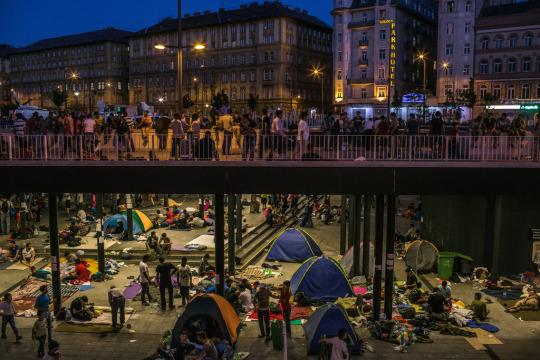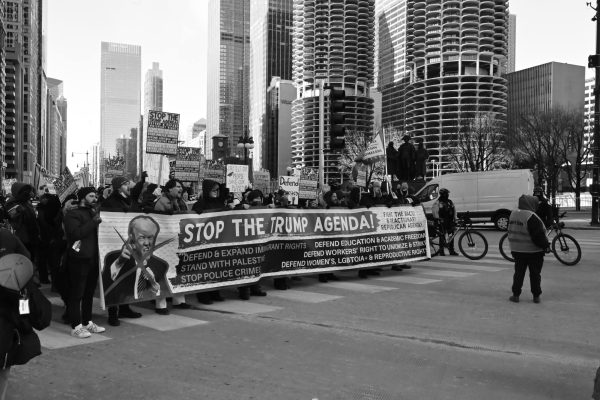Sheltering Syrian Refugees

Refugee families set up camp underneath a Budapest bridge.
When your country is in the hands of a civil war, your only option as a civilian is to leave as soon as possible.
In the fifth year of civil war, citizens of Syria continue to retreat from their home country, the combative forces of the Free Syrian Army and the government’s Islamist army. More than four million Syrians are currently fleeing to the neighboring countries of Syria. Turkey, Iraq, Jordan, and Lebanon, just to name a few. They continue to seek shelter until the war is resolved, to determine their future courses of action.
Of course, with any humanitarian relief to a group of people’s critical housing and nourishing situation, aid is being sought by major countries to provide for the refugees, in the form of materials, shelter and food.
Should any country involve itself in the sheltering of refugees from a country in conflict, especially four million that can overflow the capacity of a third world country?
Personally, the acceptance of the refugees should be possible if they are spread evenly to the countries in question. Turkey alone hosts most of the immigrants, caring for 2.1 million Syrians, as well as providing $6 million worth of assistance to the immigrants.
In comparison, the United States accepted 1,500 immigrants fleeing from the civil war.
It should be acknowledged that every country has standards to accepting fleeing immigrants. The Obama administration announced on Sept. 10 that the United States would be accepting 10,000 more immigrants into settlement within the territory. Meanwhile, the Prime Minister of Hungary, Viktor Orbán, installed a fence around the borders of Hungary connecting to Serbia, along with passing new legislation criminalizing fence crossings.
Why would a country deny the protection and care to a substantial amount of human beings, victims of exile from their deteriorating homeland, without a place to live?
Orbán argues that he would rather see the immigrants travel elsewhere than in Hungary, even questioning the religious consequences of the rise of a Muslim population in a Christian Europe. In an opinions editorial with the Frankfurt General Newspaper, Orbán said, “Is it not worrying in itself that European Christianity is now barely able to keep Europe Christian?”
Orbán’s stance is very opposing in comparison to that of the Church World Service (CWS), a global humanitarian organization representing 37 different denominations of Christianity. CWS responded to the U.S. effort in sheltering the 1,500 immigrants as “inexcusable.” “The United States can and should resettle at least 100,000 Syrian refugees this coming fiscal year, in addition to increasing our total resettlement commitment to 100,000 refugees from other parts of the world,” stated the representatives of CWS.
In Orbán’s case of denying immigrants based on religion, his fears of Muslim communities mixing with European Christian groups are an irrational danger to the cause of protecting the refugees.
If some countries are incapable of allowing immigrants from war to reside in their territory, they should at least not deter the same people by becoming hostile and criminalizing their course of escape. Instead, countries should be conversing together and providing united solutions to house and protect the immigrants until the quarrel of the country dissipates.
What can the American public do for the Syrians fleeing from their war-torn country?
The United States is capable of assisting the cause to help the Syrian refugees. At the very least, aid can be provided from people in the United States who can help keep a family safe, whether through money or effort put in volunteering to help Syrians in need of guidance.
As simple as it may be for people to throw their arms in the air and say ‘not my problem,’ the consequences of such actions are not only detrimental for the people in need, but also on the person being asked to help. To ignore the potential to help a Syrian refugee family survive is to effectively allow the further oppression and struggle of the family by turning a blind eye to their problem. Even the smallest of help can come a long way for those who seek it and make the best of it. It is possible for all refugees to find shelter and aid outside of their home, and they should not face any unnecessary obstacles in their pursuit of survival.
Your donation will support the student journalists of Northeastern Illinois University's The Independent, either in writers' payment, additional supplies and other items of note. Your contribution will allow us to purchase additional equipment for writers/photographers/illustrators and cover our annual website hosting costs.






